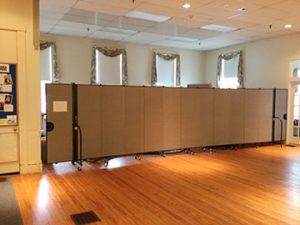
bedrooms using 6’8”-high dividers. These spaces provide transitional housing for members in need.
An outreach-minded Massachusetts church creates four bedrooms in the church — using room dividers — so that families in need have a safe, warm place to sleep.
In 2009, leaders at First Congregational Church of Rockport in Rockport, MA, were approached by the Family Promise organization, which was facing a lack of emergency beds for homeless families. Today, the church’s bedrooms house up to 14 people at a time. The program is called Family Promise North Shore Boston.
On Sunday mornings, after worship services, the four bedrooms are set up — two in a Sunday school classroom and an adjoining nursery, and two in the fellowship hall, separated by Screenflex portable dividers. Breakfast and dinner are provided.
Families stay for one week and then move on to another host church in the network. “Our church sees families at least four weeks per year,” says Outreach Committee Chair James Reed.
Reed says the church is gratified by the knowledge that it’s doing what it’s called to do. “The community sees we’re a church that uses our faith to do good works for all,” he says. “That may have benefits on Sunday mornings, when the doors open for worship.”
Here, Reed tells us more of the story.
How (and when) did the church identify the need to set up these safe, warm places to sleep within their facility?
In 2009, Family Promise told us the Commonwealth of Massachusetts had a lack of emergency beds for homeless families, and were placing families in motel rooms. At that time, there were more than 100 families in motels in our general area. Today, there are more than 250, according to local anti- poverty groups like Habitat for Humanity and Beverly Bootstraps.
Aside from room dividers, what kinds of materials were necessary to get these bedrooms up and running?
The church trustees approved and then contracted for the installation of carbon monoxide detectors in the fellowship hall, which are hard-wired to the church alarm system.
We appealed to the church and to other churches on Cape Ann, where we’re located, for sheets and blankets. Sheets and blankets were provided also by local inns and guest houses.
Cots and pillows were provided by the network of churches engaged for this program.
The fellowship hall has a kitchen from which we serve our guests dinner and breakfast. We also replaced the shades on all windows in the fellowship hall.
How does the church decide which families will occupy the spaces?
The church doesn’t take part in the process which approves families. Family Promise North Shore Boston hires a director and assistant director (both social workers) to vet guests, and then works with them to find housing. Program participants are restricted to families who aren’t chronically homeless and have no current drug, major psychiatric or abuse problems.
Logistically, how do the families come and go?
Families arrive at the church daily at 6 p.m. from the network’s Day Center, which is about 20 miles away in Beverly, MA. We serve them dinner and, after clean-up, they’re free to do as they please until roughly 10 p.m., when church doors are locked by volunteers who sleep in the church for security. Frequently, families will walk around town after dinner.
In the morning, the network van brings them to the Day Center. From there, children attend school, and parents leave for work.
What kinds of benefits has the church enjoyed as a result of setting up these bedrooms?
This is an ecumenical effort, because other churches in Rockport and Gloucester — and organizations like Rotary — supply volunteers with food, material support. Ecumenical activities are rare here; all churches benefit from ecumenism.
Now, we have a locus of care that extends throughout the church communities. Because we care for homeless families, we gain understanding of their circumstances, which helps to make us, potentially, activists for improved treatment from the political system.


